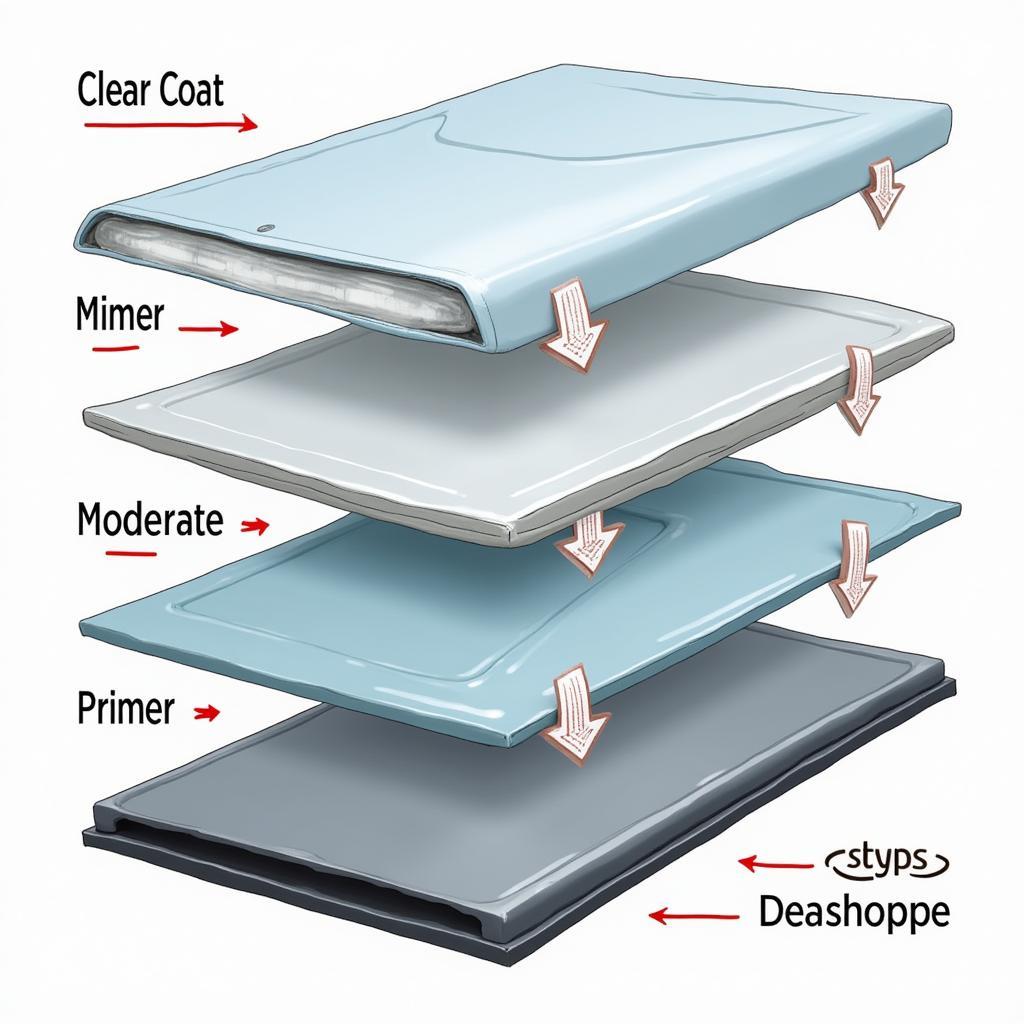Car scratch fix solutions range from simple DIY methods to professional repairs, depending on the severity of the damage. This comprehensive guide will help you assess the damage, choose the right approach, and restore your car’s finish. Whether you’re a car owner, a mechanic, or a car enthusiast, this guide provides valuable information to tackle those pesky scratches.
Understanding Car Scratch Types and Severity
Before diving into car scratch fix methods, it’s crucial to understand the different types of scratches and their severity. This will determine the best course of action.
Minor Scratches: Clear Coat and Light Surface Damage
These scratches are often barely visible and only affect the clear coat, the outermost layer of your car’s paint. They can often be addressed with DIY solutions like rubbing compound. Think of it like a superficial paper cut – annoying, but easily treated.
Moderate Scratches: Reaching the Base Coat
These scratches penetrate the clear coat and reach the base coat, the colored layer of your car’s paint. They are more noticeable and require slightly more involved car scratch fix methods like touch-up paint and polishing. Imagine a deeper cut – you might need a bandage.
Deep Scratches: Exposing the Primer or Metal
These scratches go through the base coat and expose the primer or even the bare metal underneath. They are highly visible and require professional attention to prevent rust and further damage. This is like a serious wound requiring stitches.
 Different Car Scratch Types and Severity
Different Car Scratch Types and Severity
DIY Car Scratch Fix Solutions for Minor Scratches
If you’re dealing with minor scratches, there are a few DIY car scratch fix methods you can try:
-
Washing and Drying: Thoroughly clean the scratched area with car wash soap and water, then dry it completely. This removes any dirt or debris that could interfere with the repair process.
-
Rubbing Compound: Apply a small amount of rubbing compound to a clean microfiber cloth and gently rub it onto the scratch in a circular motion. This helps to level out the clear coat and reduce the visibility of the scratch.
-
Polishing Compound: After using rubbing compound, apply polishing compound to further refine the finish and restore shine.
-
Waxing: Finally, apply a coat of wax to protect the repaired area and enhance the gloss.
Professional Car Scratch Fix for Moderate and Deep Scratches
For moderate and deep scratches, it’s best to seek professional help. A professional car scratch fix ensures a perfect color match and a flawless finish.
Touch-Up Paint
Professionals can precisely match your car’s paint color and apply touch-up paint to fill in deeper scratches. This requires careful application and blending to achieve a seamless look.
Wet Sanding
For deeper scratches that expose the primer, wet sanding might be necessary to level the surface before applying touch-up paint. This is a delicate process best left to experienced professionals.
Complete Repaint (In Extreme Cases)
In cases of extensive scratching or damage, a complete repaint might be the only solution to restore your car’s finish to its original condition.
Preventing Car Scratches: Proactive Measures
“Prevention is better than cure,” says John Peterson, a seasoned automotive repair specialist at Peterson Auto Body. “Taking proactive steps can save you time, money, and the hassle of dealing with scratches in the first place.”
- Regular Washing and Waxing: This creates a protective layer against minor scratches and environmental damage.
- Covered Parking: Protecting your car from the elements minimizes the risk of scratches from tree branches, hail, etc.
- Careful Parking: Avoid parking in tight spaces or areas with high traffic.
- High-Quality Car Covers: Invest in a durable car cover if you park outdoors frequently.
Conclusion: Keeping Your Car Looking Its Best
Car scratch fix, whether DIY or professional, can effectively restore your car’s appearance. Understanding the type and severity of the scratch is crucial for choosing the right approach. Regular maintenance and preventative measures are key to minimizing future scratches. For expert advice and assistance with car scratch repair, feel free to connect with us at AutoTipPro. Call us at +1 (641) 206-8880 or visit our office at 500 N St Mary’s St, San Antonio, TX 78205, United States.
FAQ
-
Can I use toothpaste to fix car scratches? While toothpaste can sometimes mask very minor scratches, it’s not a recommended car scratch fix solution as it can damage the clear coat over time.
-
How much does professional car scratch repair cost? The cost varies depending on the severity and location of the scratch, but it typically ranges from $50 to $500.
-
How can I tell if a scratch is deep enough to require professional repair? If you can feel the scratch with your fingernail, or if it’s penetrated the base coat, it’s best to consult a professional.
-
What is the best rubbing compound for car scratches? There are numerous quality rubbing compounds available. Research and choose one that suits your specific needs.
-
How often should I wax my car? Waxing every three to six months is generally recommended to maintain a protective layer.
-
Is it worth fixing minor scratches? Yes, even minor scratches can compromise the clear coat and lead to more serious damage if left untreated. Addressing them promptly is a worthwhile car scratch fix.
-
Can I fix a scratch that has exposed the metal myself? While touch-up paint is available for DIY use, scratches that expose the metal require specialized skills and tools to prevent rust and ensure a proper repair. Consulting a professional is highly recommended.




Leave a Reply